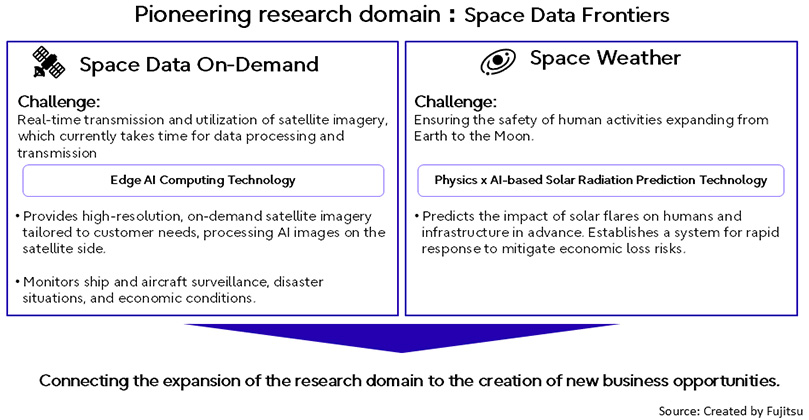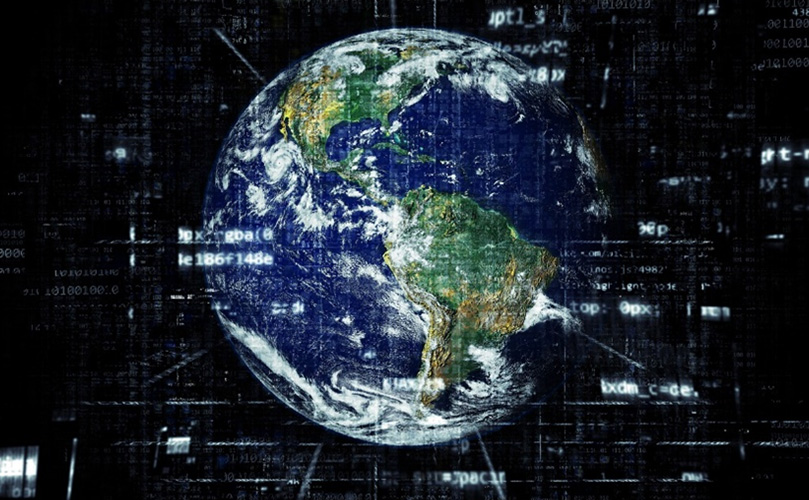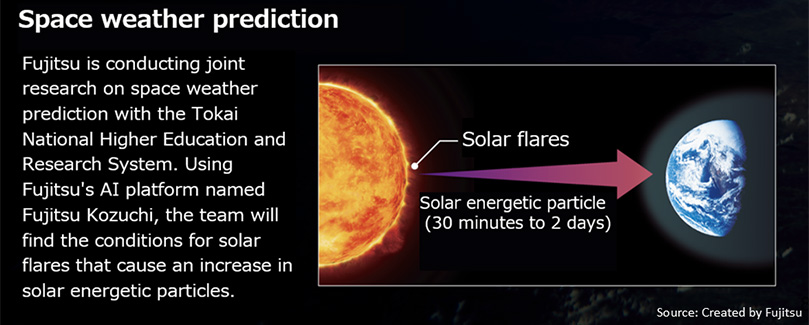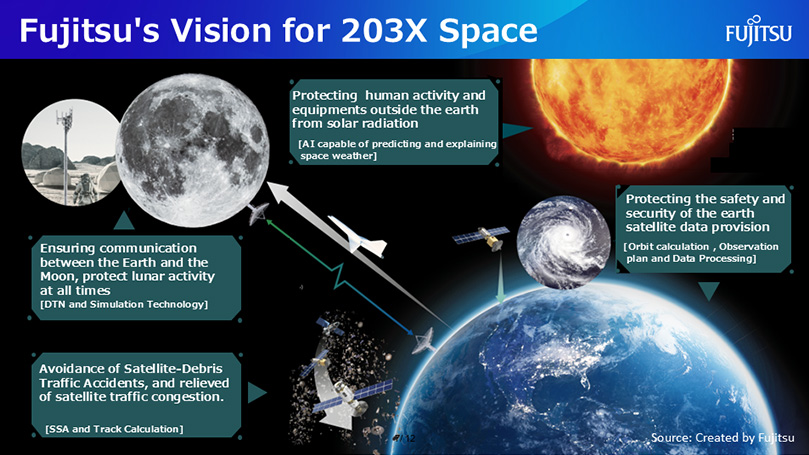Pioneering New Business in the "Space Data Frontiers"

Article| 2025-06-11
4 minute read
In April 2025, Fujitsu launched the "Space Data Frontiers" as a pioneering research domain. This initiative focuses on two key themes: "Space Data On-Demand," which involves equipping satellites with AI (Artificial Intelligence) to enable real-time transmission and utilization of satellite imagery, and "Space Weather," which aims to enhance the accuracy of predictions regarding the impact of solar flares on humans and socio-economic activities. How will Fujitsu explore this uncharted territory of space and translate it to new business opportunities? We invited Chiaki Mukai, Fujitsu's Independent Director and the first Japanese female astronaut, Nobuhiro Imaizumi, Head of the Space Data Frontiers Research Center at Fujitsu Research, who leads this new research area, and Chihiro Mitsuda, Research Director at the same center, to discuss the future of space-related business.
*The affiliations and the content of this article are valid as of the date of its original publication.
Leveraging the Power of "Data Processes"
― The name "Space Data Frontiers" evokes a future-oriented image of cutting-edge research. It suggests a future where the field of society extends to the realm of space.
Chiaki Mukai:
The name "Space Data Frontiers" embodies a determination and commitment to pioneering space, taking a direct and straightforward approach. Fujitsu possesses a wealth of know-how in "data processes", which involves guiding optimal methods for data processing, analysis, and utilization. The image of handling various data in space and opening up uncharted territory should resonate with a wide range of people.
I see data as something like "water flowing in a river," regardless of whether it's in space or not. How do you use the water flowing in a large river? You can divert it to a small stream, use it to power a water wheel, or use it as drinking water. If you control the source of the data, you can utilize it in the most optimal way according to the user's convenience and needs.
Fujitsu's strength lies in its data processing technology, but it doesn't control the source of the data. For example, shouldn't Fujitsu consider building its own satellites and having its own data points? In any case, I feel that making space data a research area is a great opportunity.
I think it's necessary to further pursue research and business that only Fujitsu can do. Space is filled with vast amounts of data. By enhancing the value of this data through Fujitsu's AI and data processing technology, we can enable customers to download only the data they need and apply it to business immediately, thereby strengthening this flow.

Nobuhiro Imaizumi:
While some argued that calling space a "frontier" was stating the obvious, we intentionally chose the name "Space Data Frontiers." We wanted to insert a word uniquely representing Fujitsu's contribution between "Space" and "Frontiers." "Data" reflects our focus on acquiring and leveraging space-related data through initiatives like AI-powered satellite data utilization and advanced space weather forecasting. This highlights the areas where Fujitsu is actively pioneering in the space domain.
In English, we deliberately use the plural form "Space Data Frontiers." This signifies that the area we are aiming for is not just one. We were particular about using the plural form in order to convey internally and externally the direction of venturing into various areas of space by making full use of data and expanding the business area by using research as a hook.
Chihiro Mitsuda:
Looking ahead to an era when humans will migrate to the moon, reducing the risk of exposure to space radiation is essential, as it could have a serious impact directly on human lives. I believe that the research we are currently undertaking to advance space weather forecasting is an indispensable technology for the future of humanity. The word "frontiers" also embodies the meaning that the initiatives we are taking "now" will create a sustainable "future."
Equipping Satellites with AI to Overcome the "Time Barrier" in Data Utilization

― Because it is an uncharted territory, there are many frontiers. The aim is to explore them with Fujitsu's technology. Could you please provide the overview and direction of Space Data On-Demand, one of the two research areas defined at the time of launch.
Imaizumi:
One of the major goals is to deploy computing and AI technology to the space-related market. We aim to equip satellites with AI, perform AI-based image processing on the satellite side, and provide satellite image data in real time according to customer needs.
Currently, high-resolution images that anyone can use are acquired over time. After image processing is performed on the ground side, images are then used according to the applications. This makes it difficult to use image data in real time. By performing AI image processing on the satellite side, it becomes possible to images such as vehicle images or farm images to the ground side according to individual needs.
This technology can be used, for example, for national security. By predicting where infringing aircraft are coming from and where they are taking off and landing in peacetime and monitoring them, we believe that it will be possible to quickly respond to crises in the event of an emergency. We also expect it to be useful in apprehending suspicious ships and identifying detailed navigation routes.
In addition to primary industries such as fisheries and agriculture, it can also be applied to the analysis of economic activities in secondary and tertiary industries, such as the operation status of industrial complexes and the supply chains of ships. I think it can also contribute to grasping the health balance between humans and the Earth, which is called "planetary health."
Mukai:
Looking down on the Earth from a high vantage point and sharing the obtained data with the ground side instantaneously. For example, it will be easier to analyze population dynamics and economic conditions based on changes in urban light. Predicting aquaculture conditions based on changes in sea water temperature or evaluating the sustainability of farmland and forests. I feel the potential in a wide range of applications.
The process and time required for data processing may vary depending on the customer's needs. I think it would be a promising new business if the value provided could be changed flexibly depending on these factors. The field of AI-based image processing is likely to be crowded with competitors. I would like to refine Fujitsu's unique strengths, such as the high quality of edge processing and the large amount of data processing.
I encourage you to explore ways to increase the number of Fujitsu fans. For example, receiving a card with a photo of your home taken from space on anniversaries such as Christmas and birthdays. It may not be a business, but it would be nice to have a buzz-worthy gimmick. Fujitsu's good point is "seriousness," but I would like to incorporate playfulness at the same time. I think it would be wonderful to take on the challenge of sublimating the concept of the Earth as seen from a satellite into something that is more relevant to a wider range of customers.
Although it is a different area from this one, considering the combination of AI and space, it could be used in fields such as analyzing the performance and failure risk of artificial satellites and controlling rovers that travel on the moon. The day when "AI agents" that move autonomously on behalf of humans will be active in space may be realized in the near future.
Imaizumi:
First of all, we have launched AI image processing on the satellite side as a new research area, but I am also very interested in applying AI to rovers. Automatic driving is also being realized due to the progress of computing technology. If a rover discovers something unknown on the moon and AI can determine it and collect detailed data, it will be a great achievement.
Enhancing the Accuracy of Space Weather Forecasting with AI

― The second research area is space weather. In 2023, Fujitsu concluded a comprehensive agreement with the Tokai National Higher Education and Research System (THERS), which consists of Nagoya University and Gifu University, in the field of space weather. In 2025, joint research by Fujitsu, THERS, and the Japan Aerospace Exploration Agency (JAXA) Space Exploration Innovation Hub Center began to apply it to lunar exploration. What kind of uniqueness and strengths will you demonstrate in the field of space weather?
Mitsuda:
Our first key aspect is the use of "explainable AI." Fujitsu's AI technology, "Fujitsu Kozuchi XAI," is fully adopted for this research. Its feature is that it can grasp the characteristics of specific phenomena even with a small amount of data. Rather than "deep learning," which reads and learns from a vast amount of data, it is a technology that comprehensively discovers important hypotheses from limited information by using the combination of all data items in the input data as a hypothesis space.
It is not possible to obtain a lot of information about events in space. Large solar flares, like large-scale earthquakes, are extremely rare. Therefore, it is significant to create important hypotheses from limited data using explainable AI, and then to have AI repeatedly evaluate these hypotheses.
Our second key aspect is collaboration with academia. In addition to having a wealth of simulation data, we have also accumulated knowledge of the data. Research in the field of space weather forecasting is progressing through physical simulation. Even if Fujitsu tries to create a physical simulation on its own, it will lack a scientific perspective. We evaluate that the advanced research system, which combines Fujitsu's technology including AI, THERS' physical simulation and data, and the lunar observation data that JAXA has knowledge of, is a unique advantage that competitors do not have.
Mukai:
There are many types and levels of AI. It is not suitable for space weather forecasting if the basis for judgment is not clear even though the AI provides an answer, in other words, it remains a "black box". I think Fujitsu's explainable AI, which also shows the process to the answer, is at a higher level of maturity. Thus, I feel that it is very compatible with space weather forecasting. AI does not only show "this is the case" based on data but also presents "shouldn't it be like this if you consider this process?" It's a good way to use AI even at the research level.
The research with the THERS will likely take an approach that pursues the essence of space radiation that affects the Earth's sphere. I think the research by the three-party alliance including JAXA will focus on space weather forecasting around the moon, which focuses on the Artemis program (a manned lunar exploration led by the United States).
Both are important research themes for the sustainable activities of humankind. Looking ahead to commercialization, it is also important to be flexible in responding to customer requests, such as what kind of space weather information to provide and how often. The Japan Meteorological Agency issues emergency earthquake alerts. They also do pollen dispersal forecasts. Although the process, data volume, and frequency are different, they provide predictions and real-time information related to weather. With Fujitsu's knowledge of data processes, I expect to shape the ideal form of space weather forecasting that meets customer needs.
Opening up Unexplored Fields with Comprehensive Technological Capabilities

― What is the significance of technology companies like Fujitsu working on space-related businesses? What kind of value can you provide to the future?
Mukai:
It is because only Fujitsu can do it. Technology is our weapon. Technology is indispensable for humankind to pioneer frontiers. Fujitsu has comprehensive technological capabilities. It has research institutes all over the world and promotes joint research with different industries and academia. Based on the comprehensive density of the technology layer, we can provide technology services tailored to customer needs.
Imaizumi:
Even within Fujitsu Research, it is no longer acceptable for the Computing Laboratory to only research and develop computing. For example, computing and AI must collaborate. At the Space Data Frontiers, we are working with AI engineers to open up space with stronger technology and expand our business area. You cannot call yourself a technology company with just a single technology.
Mukai:
The space domain is the forefront of technology. It is truly a frontier. I feel that Fujitsu's serious entry into space research will attract a great deal of expectations. In order to convey Fujitsu's technological strengths to society even more, we should aggressively advance into space. By continuing to refine the strengths of each technology, it should be possible to apply to all fields such as education and medicine. With comprehensive technological capabilities, we should be able to open up not only space but also unexplored fields. I believe that this will lead to the realization of Fujitsu's purpose: " make the world more sustainable by building trust in society through innovation."
Dr. Chiaki Mukai
Independent Director, Fujitsu Limited
Dr. Mukai, a physician and Keio University School of Medicine graduate, became a JAXA astronaut in 1985. In 1994, she made history as the first Asian woman in space, flying aboard the Space Shuttle. She flew a second mission in 1998, focusing on space medicine research. She has served as a professor at the International Space University and Director of the JAXA Space Medicine Center. She is currently the Specially Appointed Vice President of Tokyo University of Science and an Independent Director of Fujitsu (since 2015).

Nobuhiro Imaizumi
Head of the Space Data Frontiers Research Center, Fujitsu Research, Fujitsu Limited
Joining Fujitsu in 1992, Mr. Imaizumi researched semiconductor materials at Fujitsu Research, contributing to the K computer. Seconded to the Cabinet Office, he led the ImPACT program, focusing on innovations like small satellite development. After handling government relations, he established the Space Data Frontiers Research Center at Fujitsu Research.

Dr. Chihiro Mitsuda
Research Director of the Space Data Frontiers Research Center, Fujitsu Research, Fujitsu Limited
Dr. Mitsuda, who holds a Ph.D. in planetary science from Hokkaido University, joined Fujitsu FIP in 2008. As a data analysis specialist, she focused on space data business for research institutions. In 2023, she established the Space Business Research Team at Fujitsu Limited and currently leads the Space Weather Team at Fujitsu Research.

Related Information
Space Weather Prediction: A Future Powered by Explainable AI


